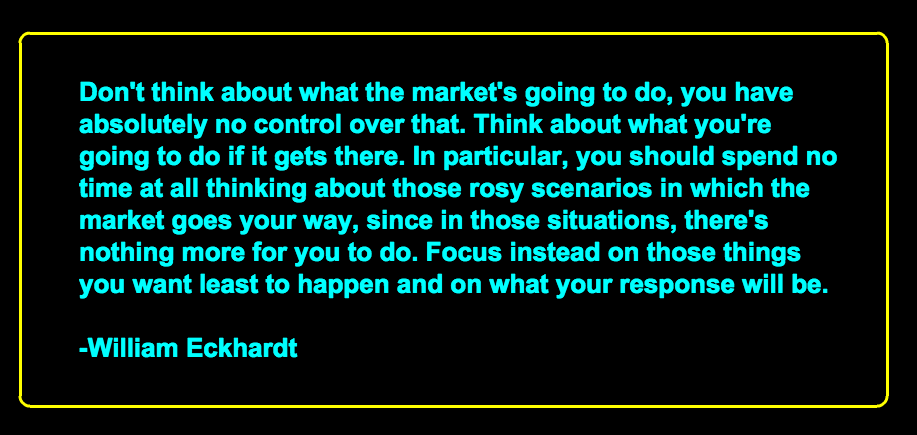Latest Posts
rss10 Unsuccessful Trading Behaviors
- Refusing to define a loss.
- Not liquidating a losing trade, even after you have acknowledged the trade’s potential is greatly diminished.
- Getting locked into a specific opinion or belief about market direction. I.E. “I’m right, the market is wrong.”
- Focusing on price and the money
- Revenge-trading to get back at the market from what it took from you.
- Not reversing your position even when you clearly sense a change in market direction
- Not following the rules of the trading system.
- Planning for a move or feeling one building, then not trading it.
- Not acting on your instincts or intuition
- Establishing a consistent patter of trading success over a period of time, and then giving your winning back to the market in one or two trades.
Profit & Loss
If you think crude oil is going lower again, this chart was made for you

Timeless Qualities Essential to Speculation
- 1. Self-reliance: A man must think for himself and must follow his own convictions. Self-trust is the foundation of successful effort.
- 2. Judgment: That equipoise, that nice adjustment of the faculties of one to the other, which is called good judgment—essential to the speculator.
- 3. Courage: That is, confidence to act on the decisions of the mind. In speculation, there is value in the dictum: Be bold, still be bold; always be bold.
- 4. Prudence: The power of measuring the danger, together with a certain alertness and watchfulness, is very important. There should be a balance of prudence and courage; prudence in contemplation, courage in execution.
- 5. Pliability: The ability to change an opinion, the power of revision. He who observes and observes again is always formidable.
Focus on those things you want least to happen and on what your response will be.

8 Types of Traders in World -Extract From Great Book 'SUPER TRADER '
Successful Trading Quotes-Video
Trading Against Fii's is like playing ping pong with Bruce Lee-Video
Some advice from Jeff Bezos

During one of his answers, he shared an enlightened observation about people who are “right a lot”.
He said people who were right a lot of the time were people who often changed their minds. He doesn’t think consistency of thought is a particularly positive trait. It’s perfectly healthy — encouraged, even — to have an idea tomorrow that contradicted your idea today.
He’s observed that the smartest people are constantly revising their understanding, reconsidering a problem they thought they’d already solved. They’re open to new points of view, new information, new ideas, contradictions, and challenges to their own way of thinking.
This doesn’t mean you shouldn’t have a well formed point of view, but it means you should consider your point of view as temporary.
What trait signified someone who was wrong a lot of the time? Someone obsessed with details that only support one point of view. If someone can’t climb out of the details, and see the bigger picture from multiple angles, they’re often wrong most of the time.




